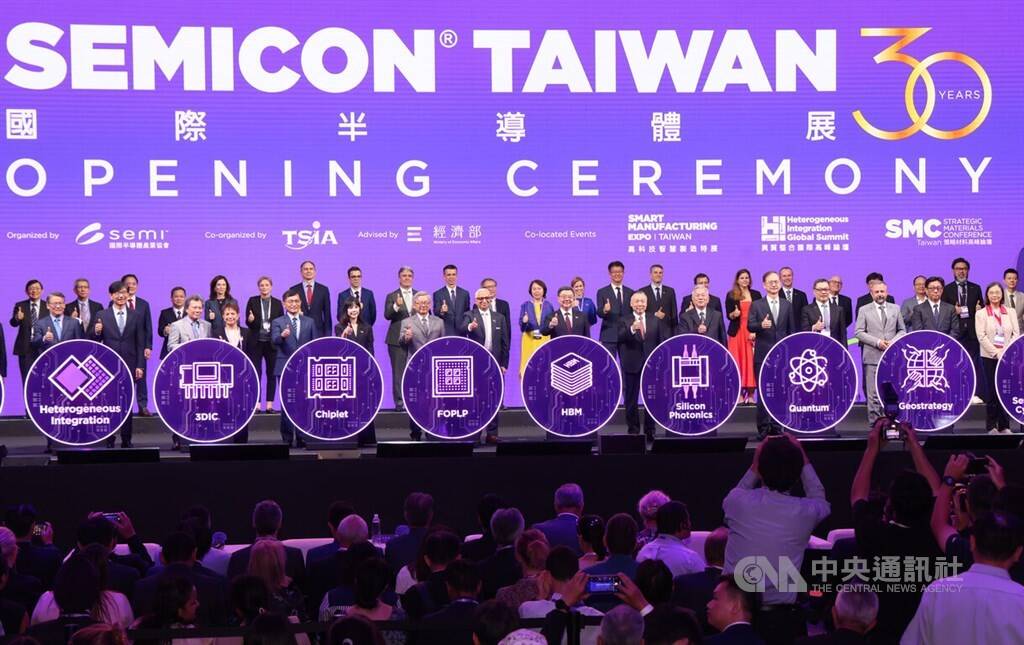Czech Science Minister Marek Zenisek and U.K. National Technology Adviser Dave Smith opened their countries’ pavilions at SEMICON Taiwan 2025 in Taipei Wednesday.
Zenisek said the Czech Republic’s pavilion showcases the country’s semiconductor cluster and will help deepen cooperation with Taiwan.
He was joined by Jan Michal, head of the investment agency CzechInvest, who said the goal was to highlight the country’s industry and connect with Taiwanese partners.

Photo: CNA
Czech media noted that Zenisek’s trip marks the first visit to Taiwan by a serving government minister from Prague, which does not maintain formal diplomatic relations with Taipei.
Meanwhile, Smith said 34 British firms are exhibiting this year, a record high, and pointed to the U.K.’s new industrial strategy aimed at strengthening its semiconductor sector.
Smith said the U.K., home to the world’s third-largest technology sector, was fully behind strengthening its semiconductor industry, noting that it had launched a new industrial strategy in June.
Also in attendance was U.K. Representative to Taiwan Ruth Bradley-Jones, who praised Taiwan’s “cutting-edge” strengths in semiconductors and artificial intelligence.
“We [U.K.] have really complementary offers, with the UK offering innovation, R&D and scalable ideas, and Taiwan providing large-scale manufacturing and global supply chains, so I really think this is a partnership that is going places,” Bradley-Jones said.
Organizers said this year’s SEMICON includes 17 national pavilions, the most ever, with Canada, Costa Rica, Lithuania, Sweden, and Vietnam joining for the first time.
More than 1,200 companies are taking part, with 4,100 booths and over 100,000 attendees expected.

LIMITED IMPACT: Investor confidence was likely sustained by its relatively small exposure to the Chinese market, as only less advanced chips are made in Nanjing Taiwan Semiconductor Manufacturing Co (TSMC, 台積電) saw its stock price close steady yesterday in a sign that the loss of the validated end user (VEU) status for its Nanjing, China, fab should have a mild impact on the world’s biggest contract chipmaker financially and technologically. Media reports about the waiver loss sent TSMC down 1.29 percent during the early trading session yesterday, but the stock soon regained strength and ended at NT$1,160, unchanged from Tuesday. Investors’ confidence in TSMC was likely built on its relatively small exposure to the Chinese market, as Chinese customers contributed about 9 percent to TSMC’s revenue last

With this year’s Semicon Taiwan trade show set to kick off on Wednesday, market attention has turned to the mass production of advanced packaging technologies and capacity expansion in Taiwan and the US. With traditional scaling reaching physical limits, heterogeneous integration and packaging technologies have emerged as key solutions. Surging demand for artificial intelligence (AI), high-performance computing (HPC) and high-bandwidth memory (HBM) chips has put technologies such as chip-on-wafer-on-substrate (CoWoS), integrated fan-out (InFO), system on integrated chips (SoIC), 3D IC and fan-out panel-level packaging (FOPLP) at the center of semiconductor innovation, making them a major focus at this year’s trade show, according

DEBUT: The trade show is to feature 17 national pavilions, a new high for the event, including from Canada, Costa Rica, Lithuania, Sweden and Vietnam for the first time The Semicon Taiwan trade show, which opens on Wednesday, is expected to see a new high in the number of exhibitors and visitors from around the world, said its organizer, SEMI, which has described the annual event as the “Olympics of the semiconductor industry.” SEMI, which represents companies in the electronics manufacturing and design supply chain, and touts the annual exhibition as the most influential semiconductor trade show in the world, said more than 1,200 enterprises from 56 countries are to showcase their innovations across more than 4,100 booths, and that the event could attract 100,000 visitors. This year’s event features 17

Germany is to establish its first-ever national pavilion at Semicon Taiwan, which starts tomorrow in Taipei, as the country looks to raise its profile and deepen semiconductor ties with Taiwan as global chip demand accelerates. Martin Mayer, a semiconductor investment expert at Germany Trade & Invest (GTAI), Germany’s international economic promotion agency, said before leaving for Taiwan that the nation is a crucial partner in developing Germany’s semiconductor ecosystem. Germany’s debut at the international semiconductor exhibition in Taipei aims to “show presence” and signal its commitment to semiconductors, while building trust with Taiwanese companies, government and industry associations, he said. “The best outcome